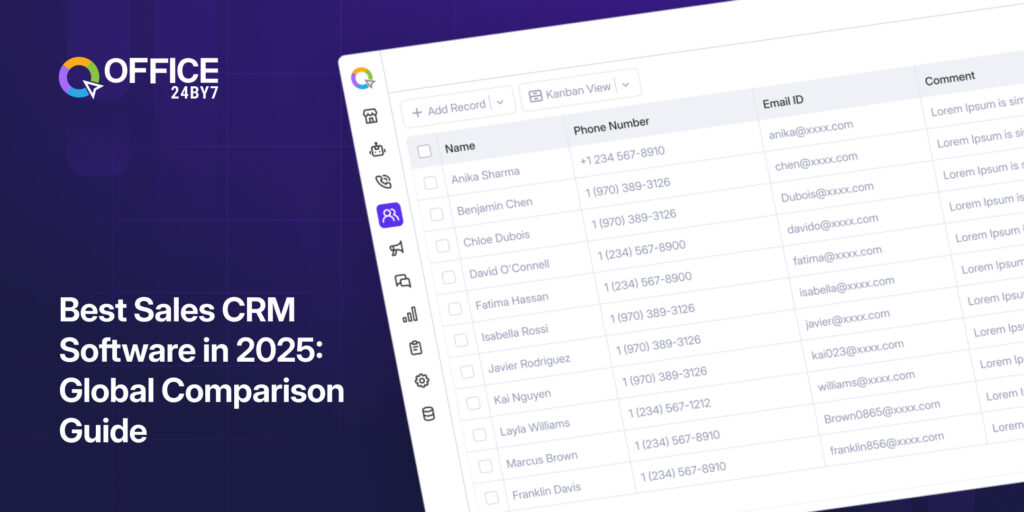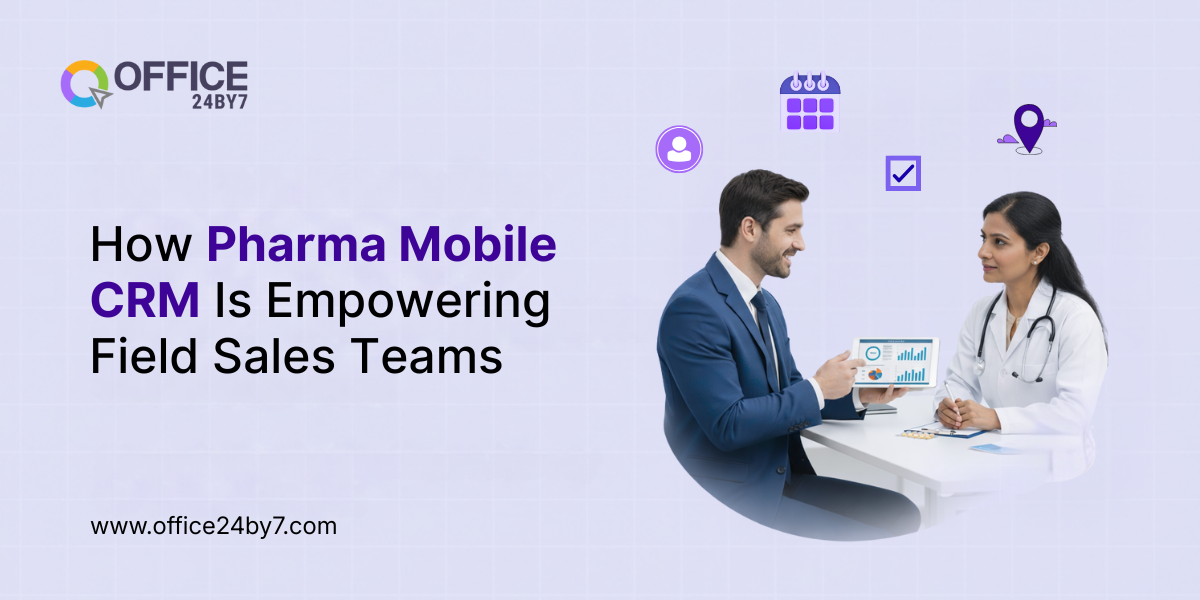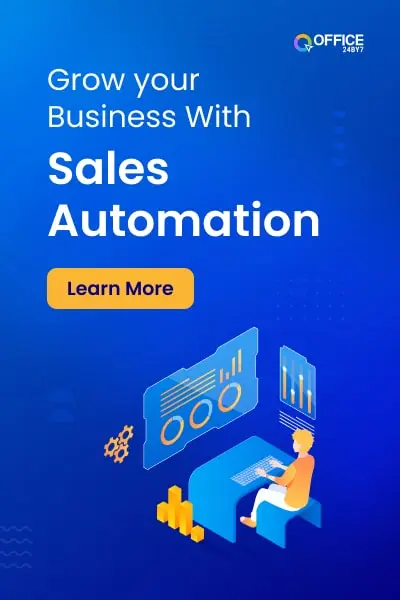
Not sure if this blog, Best Sales CRM Software, contains quality information?
Try our 1-minute short audio summary to decide. 🎧
You’re losing deals right now. It’s not because your product fails or your team lacks skill — it’s because your CRM can’t keep up. As markets saturate faster and customer expectations rise, competitors move ahead. They adopt smarter tools while you struggle with spreadsheets and scattered systems.
The CRM market will hit $163 billion by 2030, growing 14.6% annually. Companies invest in CRM because it works. Businesses using robust CRM systems report 29% higher sales, 34% better customer satisfaction, and 42% stronger retention rates. Those without one fall behind, permanently.
This guide compares the five best Sales CRM software that dominate 2025: Office24by7, Kylas, Zoho CRM, HubSpot CRM, and Salesforce. We’ll show you features, pricing, strengths, weaknesses, and exactly which businesses each platform serves best. By the end, you’ll know which sales CRM will fuel your growth globally in 2025.
What CRM Software Does and Why You Need It Now
A Customer Relationship Management system manages every interaction with prospects and customers. It tracks contact history, manages sales pipelines, automates workflows, and generates insights that drive decisions. Your CRM becomes the central nervous system connecting sales, marketing, communication, and support teams.
In 2025, CRM matters for five critical reasons:
You need pipeline visibility. Your team tracks leads through multiple stages, capture, qualification, negotiation, and closing, across different geographies and channels. Without unified visibility, deals slip through cracks and forecasts miss targets.
Customers demand omnichannel engagement. Modern buyers switch between calls, emails, chat, WhatsApp, and social media without thinking twice. Your CRM must integrate these channels seamlessly, or customers will experience frustrating, fragmented conversations.
Data drives every decision. Real-time dashboards, predictive analytics, and intelligent segmentation transform raw numbers into action. Companies leveraging CRM analytics achieve 29% higher sales productivity than competitors who guess their next move.
Scaling costs can’t explode. Traditional per-seat pricing models destroy budgets as teams grow. Adding 50 users shouldn’t cost $60,000 annually, but many CRMs charge exactly that.
Integration eliminates chaos. CRMs that connect cloud telephony services, marketing automation, and customer support create unified operations. Fragmented tools create data silos, duplicate work, and team frustration.
Global businesses adopt CRM because competition is increasing daily. Customers expect personalized experiences. Teams need speed, visibility, and reliability. Spreadsheets and disconnected tools no longer cut it.
How We Selected These Five CRMs
We didn’t choose these platforms based on marketing hype or vendor relationships. We applied strict criteria:
Global market relevance: We selected tools that businesses use across multiple countries and regional players.
Feature depth: We looked beyond basics to examine built-in cloud telephony, advanced automation, omni-channel support, and workflow customization capabilities.
Scalability range: These platforms handle teams from 5 users to 5,000 without performance issues or cost explosions.
Pricing transparency: We prioritized CRMs that avoid opaque per-seat add-ons and surprise fees that turn “affordable” options into budget disasters.
Proven reliability: We evaluated ecosystem maturity, integration partnerships, active communities, regular updates, and responsive customer support.
This comparison delivers real business value, not feature lists that look impressive but fail in practice.
Now let’s dive deep into each platform, starting with the CRM that’s redefining what businesses should expect from their sales technology. We’ll examine real features, actual costs, and honest limitations, not marketing fluff. Each platform serves different needs, and understanding these differences will save you from expensive mistakes.
Office24by7
Best All-in-One Omnichannel CRM for Growing Businesses
Office24by7 builds a full-stack platform combining communication, sales, communication, marketing, and support in one unified system. The CRM platform offers unlimited users, eliminating the per-seat cost trap that destroys budgets as teams grow.
Key Features That Matter
Office24by7 provides unlimited users and unlimited calling across all plans. This changes everything for scaling teams. The platform has built-in cloud telephony and allows integration with IVR, click-to-call, and virtual numbers that automatically log every conversation. You get complete CRM functionality, managing accounts, contacts, leads, and deals through drag-and-drop pipelines.
The marketing automation runs multi-channel campaigns across SMS, email, and voice. Integrated ticketing and support workflows handle post-sale engagement without switching platforms. Custom applications adapt to industry-specific requirements. Native WhatsApp Business integration engages customers on their preferred messaging platform. Full-featured mobile apps for iOS and Android empower field sales teams working remotely.
What Office24by7 Costs
Base pricing starts at ₹ $8,125 monthly (approximately $95). The platform offers a 15-day free trial with full feature access, with no credit card required. You see transparent pricing with no hidden per-user fees. Annual plans receive additional discounts.
Why Teams Choose Office24by7
True unlimited users eliminate per-seat scaling costs, delivering unprecedented value for growing teams. Deep communication, CRM, and support integration reduces tool sprawl and consolidates spending across vendors. Customizable workflows adapt to vertical needs in real estate, healthcare, education, finance, etc. Transparent, flat, and flexible CRM pricing plans prevent surprise fees. 24/7 customer support with dedicated account management keeps teams productive. Built-in call recording costs nothing extra.
Where Office24by7 Falls Short
Highly customized enterprise deployments may require customized pricing.
Who Should Use Office24by7
Startups, SMEs, and mid-tier and large business enterprises consolidating multiple systems into one unified sales CRM platform benefit most. Companies with distributed sales teams needing robust calling capabilities and omnichannel communication see almost immediate ROI.
Zoho CRM
Best for Affordability and Broad Integrations
Zoho CRM achieves global recognition by balancing features, integrations, and competitive pricing. India’s homegrown CRM success story now serves businesses worldwide.
Core Capabilities
Zoho provides comprehensive lead, contact, and deal management with multi-pipeline capability. Sales automation includes scoring, assignment rules, and territory management. Deep integration with Zoho’s suite, Desk, Campaigns, Analytics, Books, plus thousands of third-party apps, creates ecosystem strength. Advanced analytics and dashboards with AI assistant Zia power higher tiers. Omnichannel support spans email, live chat, social media, and telephony integrations. Workflow automation and blueprints standardize processes.
What You Pay
The free version accommodates up to 3 users with basic features. Standard pricing runs approximately $10 per user monthly. Professional tier costs roughly $16- $28 per user monthly. Enterprise reaches about $30 per user monthly. Ultimate tier pricing climbs higher for advanced AI, business intelligence, and multi-user portals.
Zoho Advantages
Very cost-competitive pricing for extensive features offered. Vast integration ecosystem connects 40+ Zoho apps plus thousands of external integrations. Strong AI and analytics support in upper tiers. Excellent customization options with custom modules and fields. Global presence with localization for multiple regions.
Zoho Drawbacks
Per-user pricing grows linearly as teams expand. Critical features like AI and advanced automation lock into upper-tier plans only. Complexity increases with numerous options, creating steeper learning curves. Telephony features require add-ons or third-party integrations.
Zoho Fits These Businesses
Companies seeking mature, reliable sales CRM, balancing cost and capability, benefit from Zoho. Organizations already invested in the Zoho ecosystem or requiring extensive customization find strong value.
HubSpot CRM
Best for Marketing-Focused Teams
HubSpot CRM builds reputation by combining a generous free tier with excellent marketing and sales synergy, pioneering the inbound methodology that transformed digital marketing.
Platform Features
The free-forever CRM core provides limited features such as contact management, deals, tasks, email logging, forms, and up to a thousand contacts. Paid Sales Hub adds pipeline automation, sequences, lead scoring, meeting scheduling, and e-signature capabilities. Strong marketing integration through Marketing Hub enables campaigns, workflows, and landing pages. Built-in analytics, dashboards, and A/B testing drive optimization. Omnichannel capabilities expand through additional modules like Service Hub and Operations Hub. Extensive third-party integrations flow through HubSpot Marketplace.
HubSpot Pricing
Free core CRM with basic features, unlimited contacts, truly free forever. The Sales Hub Starter plan is priced at $15 per user each month. The Professional plan costs around $95 per user per month, while the Enterprise plan goes up to approximately $141 per user per month. Marketing, Service, and Operations Hubs carry separate pricing.
Why Teams Love HubSpot
Scalable entry via free tier excels for testing and small teams. Excellent synergy between marketing and sales modules creates unified operations. Strong ecosystem with comprehensive documentation and active community support. Intuitive interface minimizes learning curves. Regular feature updates drive continuous innovation.
HubSpot Limitations
Per-user costs become heavy as you scale, especially needing multiple hubs. Advanced features are distributed across marketing or service hubs, not the base sales platform. Phone support is limited to the professional tier and above. No built-in calling, and requires integrations or additional purchases.
HubSpot Ideal Users
Teams prioritizing inbound marketing plus sales alignment find a perfect fit. Organizations wanting integrated content marketing, lead nurturing, and sales pipeline in one platform see strong results. Startups testing CRM adoption benefit from a generous free tier.
Salesforce
Best for Large Enterprises with Complex Needs
Salesforce dominates as the legacy CRM powerhouse with the deepest customization capabilities and unmatched scalability. The most feature-rich and widely adopted CRM globally serves the Fortune 500 standard.
Enterprise Capabilities
Comprehensive pipeline and opportunity management with advanced forecasting power and strategic planning. Highly customizable objects, workflows, reports, and process automation adapt to any business model. The Rich AppExchange ecosystem provides thousands of third-party apps and integrations.
AI and Einstein analytics deliver predictive insights and automation orchestration. Multi-departmental modules span sales, service, marketing, commerce, and analytics. Enterprise-grade security, governance, and compliance certifications meet the strictest requirements.
Salesforce Costs
Starter/Essentials tier begins at $25 per user monthly with limited features. Professional reaches $100 per user monthly. Enterprise hits $175 per user monthly. Unlimited and top tiers climb to approximately $350 per user monthly. 30-day free trial provides testing opportunity.
Salesforce Strengths
Unmatched customization and scaling potential build virtually any workflow. Rich partner ecosystem and integration option, AppExchange hosts 7,000+ solutions. Enterprise-grade security, governance, analytics, and compliance certification. Proven at massive scale across Fortune 500 companies. Extensive training resources through the Trailhead platform.
Salesforce Weaknesses
Very high per-user costs in enterprise tiers, often exceeding $500 per user monthly with add-ons. A complex setup and steep learning curve often require dedicated Salesforce administrators. Add-ons and licenses stack rapidly, Marketing Cloud, Service Cloud multiply costs. Overkill for small to mid-size businesses.
Salesforce Best Fit
Large organizations, global operations, or enterprises requiring deep customization, advanced automation, and vast connectivity across complex business processes choose Salesforce.
Kylas CRM
Best for Simple Setup and SMB Adoption
Kylas positions itself as a sales-focused CRM with flat pricing and unlimited user licenses, attracting growing Indian businesses and SMBs seeking simplicity.
Key Features
Kylas offers unlimited user licenses under its “Elevate” plan. The platform manages leads, deals, and pipelines through visual boards. Reporting and dashboards surface key sales metrics. Workflow automation, email campaigns, and task management streamline operations. API and integration support connect third-party tools. Role-based access control, lead segmentation, and automated alerts keep teams organized.
Pricing Structure
The free “Embark” plan provides basic features with limited records and functionality. The Elevate plan costs $150 monthly flat rate for unlimited users. The “Exceed” plan targets high-volume enterprises with less public pricing details.
Kylas Strengths
Predictable costs regardless of user count create budget-friendly scaling for growing teams. Rapid deployment and lighter setup minimize learning curves. The platform delivers strong feature-to-value ratios for SMBs. India-focused development includes local payment options and support.
Kylas Limitations
Large enterprises may find advanced modules lacking. Feature richness lags established global competitors in some domains. Limited telephony integration compared to comprehensive platforms. No built-in calling or advanced communication features exist.
Best Kylas Use Cases
Small to mid-size teams avoiding per-user scaling costs find value here. Sales teams wanting a ready-to-use CRM with minimal configuration benefit from Kylas’s simplicity.
CRM Feature Comparison: What Matters Most
We compared these five CRMs across features that actually impact your sales performance and budget:
| Feature | Office24by7 | Zoho CRM | HubSpot CRM | Salesforce | Kylas |
| Unlimited Users | ✓ | ✗ | ✗ | ✗ | ✓ |
| Unlimited Calling | ✓ | ✗ | ✗ | ✗ | ✗ |
| Native WhatsApp | ✓ | Third-party | Third-party | Third-party | Limited |
| Built-in Call Recording | ✓ | Add-on | Add-on | Add-on | ✗ |
| Transparent Pricing | ✓ | ✓ | ✗ | ✗ | ✓ |
| 24/7 Support | ✓ | Business Hours | Email/Chat | Premium Only | Business Hours |
| Workflow Automation | Advanced | Advanced | Good | Advanced | Basic |
| Free Trial | ✓ | ✓ | ✓ | ✓ | ✓ |
| Mobile CRM | ✓ | ✓ | ✓ | ✓ | ✓ |
| Industry Modules | ✓ | ✓ | ✓ | ✓ | Limited |
What This Comparison Reveals
Office24by7 distinguishes itself through unlimited user and calling models, eliminating scalability constraints and per-seat costs, crushing traditional CRM platforms. Native WhatsApp bot integration, built-in call recording without extra fees, transparent pricing, and round-the-clock customer support position Office24by7 as the most accessible enterprise-grade solution for businesses prioritizing communication and growth.
Salesforce offers great customization for large enterprises with dedicated IT teams and substantial budgets. HubSpot provides strong entry-level options for marketing-focused startups. Zoho CRM remains highly competitive for mid-market businesses comfortable with moderate complexity. Kylas serves Indian SMBs seeking basic functionality with predictable pricing.
For businesses prioritizing unlimited scalability, integrated communication tools, predictable costs, and all-in-one platform capabilities, Office24by7 emerges as the clear frontrunner in 2025.
Each of these five CRMs excels in specific scenarios. Salesforce dominates enterprise complexity. HubSpot wins for marketing-first teams. Zoho balances affordability with depth. Kylas simplifies for Indian SMBs. But raw features mean nothing if you choose the wrong platform for your business model, growth stage, and team capabilities.
The real question isn’t “which CRM is best?” The real question is “which CRM fits my business today and supports my growth tomorrow?” Let’s build a practical framework that answers that question with clarity.
Reorganize your office with Office24by7!

How to Choose Your CRM: A Decision Framework
Choosing a CRM isn’t about finding the “best overall” platform. You need the best platform for your business. Follow this framework:
Identify Your Size and Growth Stage
Calculate your current team size and project 24 months forward. For instance, startups with 5–20 users have different needs than SMEs with 20–200 users or large enterprises with 200+. If you’re scaling quickly, per-user licensing becomes prohibitively expensive. Calculate projected costs at 2x and 5x your current team size.
Define Your Must-Have Features
List essential features before evaluating platforms. Do you need built-in telephony? Omnichannel messaging covering WhatsApp and SMS marketing? Custom workflows? Integrated marketing automation? Customer support ticketing? Create a prioritized checklist and eliminate CRMs missing your top five requirements.
Evaluate Pricing Transparency
Opaque pricing and hidden add-ons turn “cheap” CRMs into expensive nightmares. Ask vendors: What’s included in the base price? What costs extra, users, calling minutes, storage, and integrations? Are there setup fees or onboarding costs? What happens when you scale?
Consider Future Scalability
Choose systems that adapt as you add users, products, geographic regions, or business verticals. Migrating CRMs costs money, time, and momentum. Select platforms supporting your growth for 3-5 years minimum.
Test with Free Trials
Nothing beats hands-on experience. Set up typical workflows. Test integrations. Simulate your sales process. Involve actual sales team members in the evaluation. Run parallel tests with 2-3 finalists before deciding.
Start your free trial with Office24by7 today and experience it side-by-side with your current system.
Why Office24by7 Stands Out Globally
Few CRMs offer unlimited user access plus all-in-one capabilities, plus transparent pricing. Office24by7 positions itself uniquely in 2025’s landscape by combining all three.
Scale Without Fear
You don’t pay more as your team grows. Add 10, 50, or 500 users without budget renegotiations. Unlimited calling eliminates per-minute charges that add thousands to monthly bills for outbound sales teams.
Predictable Budgets Matter
There are no hidden seat charges, unexpected module fees, or complicated tier-based user pricing. You know exactly what you’ll pay this month, next quarter, and next year. This predictability proves critical for financial planning and budgeting.
Global Operations, Local Support
Built for scaling across geographies with multi-currency support, local payment options, and 24/7 customer support spanning time zones. No matter where your team works, in Mumbai, Dubai, Singapore, or London, they always receive fast, reliable support.
Eliminate Tool Sprawl
Office24by7 combines sales CRM, cloud telephony, WhatsApp business messaging, email campaigns, SMS marketing, ticketing management system, and custom workflow automation under one roof. This reduces multiple vendor contracts, integration headaches, training complexity, and total ownership cost.
Communication-First Design
In contrast to CRMs that add telephony as an afterthought, Office24by7 builds communication at its core. This makes collaboration smoother and faster. Click-to-call, automatic call logging, call recording, IVR systems, and omnichannel messaging work natively, not through third-party integrations that break frequently.
Therefore, whether you’re a growing startup, expanding SME, or large enterprise, Office24by7 supports your growth without costly migrations or inflated budgets.
Choose Your Growth Partner
Choosing the right CRM in 2025 means looking beyond features. You need a platform that scales with your team, unifies communication, and offers transparent pricing.
Most CRMs charge per user; your cost rises with every hire. Platforms with unlimited users eliminate that problem. And when calling, messaging, and email are built in, you avoid juggling disconnected tools.
Each CRM serves different needs; some excel in marketing automation, others in enterprise workflows or simple setups. The right choice depends on your team size, budget, and daily use. Switching later is costly, so pick one that fits your current and future growth.
Use free trials. Test real workflows with your team.
If you want unlimited users, built-in communication, 24/7 support, and clear pricing, try Office24by7. One platform, all-in-one growth.
Start your 15-day free trial (no credit card required), or book a demo today.
Call us at +91-7097171717 or email sales@office24by7.com





